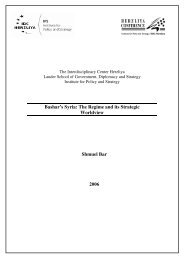Iran: Cultural Values, Self images and Negotiation Behavior
Iran: Cultural Values, Self images and Negotiation Behavior
Iran: Cultural Values, Self images and Negotiation Behavior
You also want an ePaper? Increase the reach of your titles
YUMPU automatically turns print PDFs into web optimized ePapers that Google loves.
<strong>Iran</strong>: <strong>Cultural</strong> <strong>Values</strong>, <strong>Self</strong>-<strong>images</strong> <strong>and</strong> Negotiating <strong>Behavior</strong>history to devious Machiavellian-type machinations of coalitions of enemies <strong>and</strong>foreign powers (primarily Great Britain, the USA, Israel <strong>and</strong> the Jews) by use ofubiquitous secret associations <strong>and</strong> intelligence organizations. The belief inconspiracies also renders <strong>Iran</strong>ians receptive to implicit threats even over <strong>and</strong> abovethe actual credibility of the threat.<strong>Iran</strong>ian societal norms reflect a multitude of contradictions. Individualism is, byfar, the most prominent trait usually associated with <strong>Iran</strong>ians, both by <strong>Iran</strong>iansthemselves <strong>and</strong> by foreigners. Some observers of <strong>Iran</strong>ian culture have described the<strong>Iran</strong>ian proclivity towards individualism as the result of geographic conditions,modalities of family life, or the despotic structure of all the political regimes that havebeen in power in <strong>Iran</strong>, forcing the individual to fend for himself <strong>and</strong> his family <strong>and</strong>not to trust anyone outside of his intimate circle. Individualism, however, does notimply social atomism. The <strong>Iran</strong>ian Nomenklatura is composed of close knit “old boysclubs” made up of comrades in arms, extended families of the bazaar <strong>and</strong> the clergywith extensive access to the leadership. The extended family with a network ofpersonal ties provides the mechanism for social mobility, business success, politicalacceptance, <strong>and</strong> protection from the arbitrariness of the regime. <strong>Iran</strong>ian social-politicalcircles external to the family are embodied in the institution of dovreh (circle), thepractice of party-baazi (protectionism), <strong>and</strong> ravaabet (connections).Individualism has been seen as the source of another major trait frequentlyattributed to the <strong>Iran</strong>ian – suspicion <strong>and</strong> mistrust of anyone outside one’s immediateinner circle, <strong>and</strong> especially of anyone in power, of governments, <strong>and</strong> of foreignpowers. Common Persian adages prepare the <strong>Iran</strong>ian to expect the worse of fate, <strong>and</strong>even worse of people who have achieved high office <strong>and</strong> to regard chance asparamount, with the skill of the player necessary in order to maximize the advantagefrom good throws of the dice, <strong>and</strong> to minimize the damage <strong>and</strong> future risk resultingfrom bad throws.<strong>Iran</strong> is exceptional as well in that it is one of the few Muslim societies which haveundergone popular revolutions. Indeed, intellectual <strong>and</strong> military rebellions againstthe Arab domination emerged in <strong>Iran</strong> from the beginning of the Muslim conquest <strong>and</strong>in the 20 th century alone, <strong>Iran</strong> went through a series of revolutionary upheavals.Again, in an apparent contradiction, strict hierarchy, acceptance of authority (as longas it lasts) <strong>and</strong> subservience have also been seen as characteristics of <strong>Iran</strong>ian society.One possible deciphering of the “code” of revolutionarism vs. acceptance of authorityin <strong>Iran</strong>ian society is that <strong>Iran</strong> has through the ages been a “short term society” caughtin a cyclical pattern of arbitrary <strong>and</strong> despotic rule: social uncertainty→growingdiscontent→chaos→willingness to accept any new regime in order to put an end tothe chaos→new despotic <strong>and</strong> arbitrary rule. This cycle seems to be behind thetendency towards subservience to the incumbent ruler, the ease with which theopportunity to overthrow him may be seized, <strong>and</strong> the willingness to accept a newdespot as long as he provides respite from the period of anarchy.<strong>Iran</strong>ians pride themselves on traditions of science, rationalism <strong>and</strong> pragmatism.<strong>Iran</strong>ian national ethos takes pride in the image of a hard working <strong>and</strong> methodicalnational character. In this regard, <strong>Iran</strong>ians frequently cite the contrast between <strong>Iran</strong>ian“scientific” mentality <strong>and</strong> Arab “emotionalism”. Positive “rational” traits that <strong>Iran</strong>ianstend to ascribe to their own “national character” include “cleverness”, patience innegotiation, sophistication, bargaining skills, dissimulative abilities <strong>and</strong> pragmaticii
















